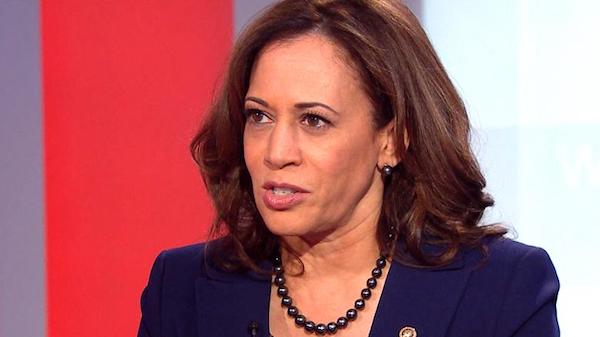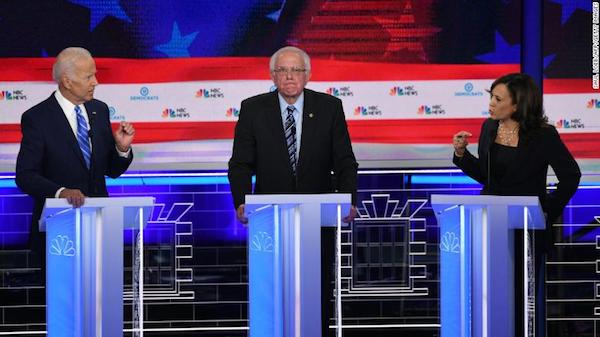

WHO INFLUENCES WHOM, WHEN, WHERE AND HOW IS THE ESSENCE OF ALL POLITICS
“Based on Kamala Harris’ performance and her competitiveness, there is no doubt in my mind that she will be able to convince the delegates at the nominating convention that she is second to none. Patrick Buchanan, political pundit and the former Speaker, Newt Gingrich have also said that Kamala Harris is likely to be the candidate”, says the author.
Before the debate Kamala Harris had the name recognition problem. Vice President Biden was well known and was enjoying a commanding lead in the polls. Kamala Harris had to formulate strategy to become most competitive. She knew the power and influence of the national TV audience could make a difference. Therefore, she came to the debate very well prepared.
Born to her mother from Chennai, India and father from Jamaica, both Ph.D.’s, Kamala Harris is a smart student and had accumulated political skills by serving as San Francisco’s District Attorney and California’s Attorney General, before she was elected U.S. Senator, first for Indian American.
Kamala Harris knew that unless she is most competitive with Biden and Sanders, she had no chance to emerge out of 20 candidates. Thus, she applied the principle: WHO INFUENCES WHOM WHEN WHERE AND HOW IS THE ESSENCE OF POLITICS.
She was well aware that the national debate would draw a large audience and if she makes a difference she could break out. She turned out to be right. The second debate drew an audience of 18 million people against 24 million for first Trump debate.
She knew that once she impresses such a large audience, political equilibrium and polls would change. She was right. How did she do it? What was her strategy?
NBC had several anchors, who were not well organized. The debate was not well programmed. Different anchors were asking questions after questions giving very little time for the candidate to answer. As a result, the competition to be heard was stiff. It was not easy to break in especially when several were attempting to speak. There was total confusion and no order. This is where Kamala Harris emerged as a big winner. Her tactics and strategy succeeded.
Kamala Harris was bent upon taking the big elephant Biden blocking her march to the convention.
Gentlemen, you can’t fight here, this is the debate stage! Senator Kamala Harris’s first attempt at a breakout moment in this debate was a painfully rehearsed line designed to be dropped the minute there was some crosstalk she could break into:
“Hey guys, America does not want to witness a food fight. They want us to know how we are going to put food on their table.”
It won immediate applause, sustained applause, undermining their party’s political well-being. This is a debate. Everyone on stage is supposed to be making a case for why they should be president, which when facing other candidates in an election, is traditionally done by drawing distinctions between yourself and your opponents.
More broadly, the line speaks to the self-defeating tendency of Democrats to imagine that their own affinity for compromise reflects the median voter’s preference for conciliatory politics. People say they have partisan conflict, yes—but they vote for people who draw sharp distinctions between themselves and their (negatively defined)opponents. It was a good line for Harris in the moment, but it was a cynical line masquerading as a plea for unity.

CNN Screenshot
“I believe you are not a racist. It was hurtful to hear you talk about the reputations of two U.S. Senators who built their reputations and career on segregation of race in this country. And it was not only that, but you also worked with them to oppose bussing. And you know, there was a little girl in California who was part of the Second Class to integrate her public schools and she was bussed to school every day and that little girl was me.”
Almost immediately after she punched Biden, a video of Kamala Harris as a child dressed for school was circulated in the social media.
Biden was flustered, caught off-guard by this unexpected expression of lived experience. Biden was not just criticized for his nostalgia play. He was confronted with the fact that his efforts as a young senator would have ended one of the country’s few attempts to make equal treatment a reality, to give black students the kind of education that white students took for granted . And while it is tempting to portray this as ancient history, it is not. Harris was born in 1964, just three months after President Johnson signed the Civil Rights Bill. Biden joined the Senate in 1973. It was 1977 when Biden introduced Bill that would, in his words, “strike at the injustice of court-ordered busing.”
Astring of recent polls suggest that Kamala Harris’s performance in the debate last week has propelled her campaign for the Democratic presidential nomination in July 2020. A Quinnipiac University poll of Democrats and Democratic leaning voters nationally showed Kamala Harris, whose criticism of Biden’s record on race was one of the most discussed moments of the second debate last week, gaining significant momentum in the campaign.
KAMALA HARRIS POLLS AT 20% IN THE QUINNIPIAC POLL, TRAILING FRONT RUNNING BIDEN BY JUST 2 POINTS.
Other polls also show strong support for the California Democrat. A Suffolk University/USA Today poll of likely Iowa Democratic caucus goers also showed her in second place to Biden. The former Vice President led that poll with 24% of respondents saying they support him, and 15.6% reported favoring Harris.
In a poll of Democrats and Democratic leaning independents conducted by CNN and SSRS in the days after the debate, 17% of respondents said they supported Harris, again placing her in second place to Biden. That represented a jump from 8% from the month before.
After the second debate, it is clear that both Biden and Sanders have lost their momentum to the women candidates, Kamala Harris and Elizabeth Warren. 56% of the primary voters are women. If so, it is possible that the voters may prefer to elect a woman.
ROADMAP TO NOMINATION
I list below the number of delegates from early States till March 3, 2020: Iowa 49; New Hampshire 33; Nevada 48; S.C. 63 – total of 193. CA 495; Texas 262; NY 270, MA 114, IL 184, FL 248, MI 147. Before March 3, we would have elected 193. By the end of March, two thirds of all delegates would have been elected.
Therefore, if Kamala Harris does reasonably well in Iowa, NH, S.C. and Nevada, she would become the front runner on March 3 after the primaries because CA has 495 delegates. Right now, the wind in California is blowing in her favor. Biden has lost his territory big.
Kamala Harris has already tested the national waters thru her first debate. It is easier for her to challenge her competitors Biden, Sanders, and Elizabeth Warren in the second and future debates. Kamala Harris is continuing to receive wide media coverage.
STRATEGIC SKILLS AND ABILITY TO CHALLENGE THE OPPONENT IN THE GENERAL ELECTION WILL BE THE DECIDING FACTOR FOR SELECTING THE NOMINEE. Based on Kamala Harris’ performance and her competitiveness, there is no doubt in my mind that she will be able to convince the delegates at the nominating convention that she is second to none. Patrick Buchanan, political pundit and the former Speaker, Newt Gingrich have also said that Kamala Harris is likely to be the candidate.
Winning the nomination is one thing. Can Kamala Harris challenge President Trump in the General Election in November 2020? Will she able to draw working class white votes from the rust belt states of PA, WI, OH, MI? Will the moderate and conservative White women vote for her? Will she compromise too much with the extreme left to get the nomination but only to lose in the general election? Can she suggest a workable bipartisan solution to the Immigration problem? These questions cannot be answered now until the political process takes place.
If Kamala Harris clinches the nomination for the President from the Democratic Party, it would be a great achievement for her, and the Indian Americans will be proud.
(The author is MBA, Columbia School of Business and Chairman, Asian American Republican Committee. He can be reached at vpwaren@gmail.com)





Be the first to comment